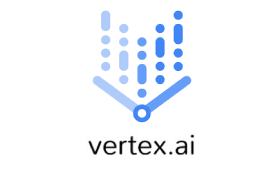Google Vertex AI
Build, deploy, and scale ML models faster, with pre-trained and custom tooling within a unified artificial intelligence platform.
- Build with the groundbreaking ML tools that power Google, developed by Google Research
- Deploy more models, faster, with 80% fewer lines code required for custom modeling
- Use MLOps tools to easily manage your data and models with confidence and repeat at scale
BENEFITS
Train models without code, minimal expertise required
Take advantage of AutoMLto build models in less time. Use Vertex AI with state-of-the-art, pre-trained APIs for computer vision, language, structured data, and conversation.
Build advanced ML models with custom tooling
Vertex AI’s custom model tooling supports advanced ML coding, with nearly 80% fewer lines of code required to train a model with custom libraries than competitive platforms (watch Codelab).
Manage your models with confidence
Vertex AI’s MLOps tools remove the complexity of model maintenance, such as Vertex AI Pipelines, to streamline running ML pipelines, and Vertex AI Feature Storeto serve, and use AI technologies as ML features.
KEY FEATURES
One AI platform, every ML tool you need
A unified UI for the entire ML workflow
Vertex AI brings together the Google Cloud services for building ML under one, unified UI and API. In Vertex AI, you can now easily train and compare models using AutoMLor custom code training and all your models are stored in one central model repository. These models can now be deployed to the same endpoints on Vertex AI.
Pre-trained APIs for vision, video, natural language, and more
Easily infuse vision, video, translation, and natural language ML into existing applications or build entirely new intelligent applications across a broad range of use cases (including Translationand Speech to Text). AutoMLenables developers to train high-quality models specific to their business needs with minimal ML expertise or effort. With a centrally managed registry for all datasets across data types (vision, natural language, and tabular).
End-to-end integration for data and AI
Through Vertex AI Workbench, Vertex AI is natively integrated with BigQuery, Dataproc and Spark. You can use BigQuery MLto create and execute machine learning models in BigQuery using standard SQL queries on existing business intelligence tools and spreadsheets, or you can export datasets from BigQuerydirectly into Vertex AI Workbench and run your models from there. Use Vertex Data Labelingto generate highly accurate labels for your data collection.
Support for all open source frameworks
Vertex AI integrates with widely used open source frameworks such asTensorFlow, PyTorch, and scikit-learn, along with supporting all ML frameworks and artificial intelligence branches via custom containers for training and prediction.

